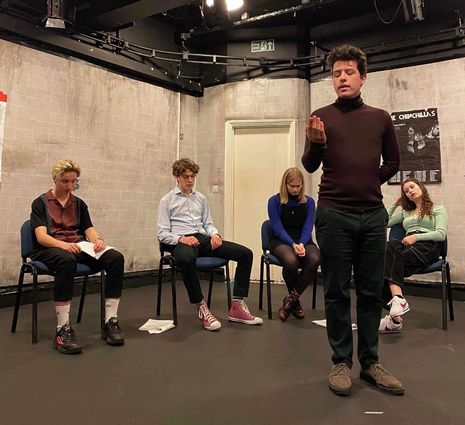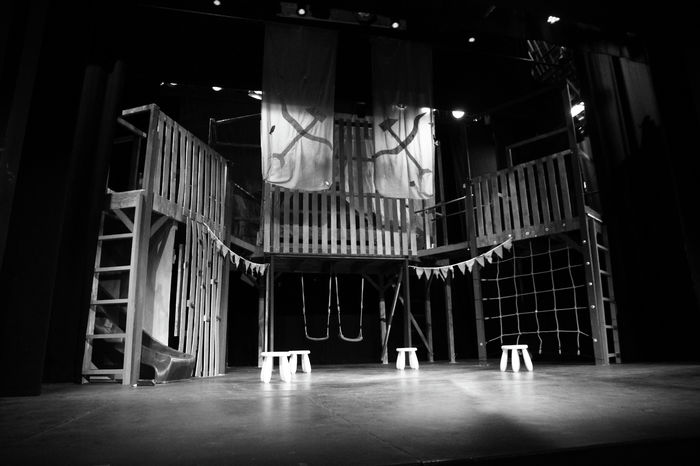CTRL-Z: A message about technology that’s long overdue
CTRL-Z promises to say something original about the internet that’s more interesting than ‘get off your phone’

What has changed since the dawn of the Internet? It’s consuming our lives more than ever, and it’s a conversation that most of us know very well.
So instead of talking about the Internet, let’s talk about CTRL-Z, a new play written by Georgie Newson-Errey and directed by Izzy Collie-Cousins. The action plays out in a single setting, a church called St. Matthew’s, which serves as the venue for a rather peculiar group: the Society for Virtual Oblivion. The members, apparently, are brought together by the common desire to erase themselves from the Internet. Their names are Ray, Guy, Lola, Mark, and Rhoda, all in their twenties. There are two archaeologists, Harry and Julia, in their late forties-early fifties, who are interested in the church because of the mysterious tunnels beneath it. And then there’s the Algorithm.
The Algorithm is a voice which speaks long, deliciously poetic monologues, spliced between scenes of dialogue. Partly, the monologues serve to remind the audience of the background to the play, a surveillance capitalism slightly more developed than our own – a concept described in the book of the same name by the sociologist Shoshana Zuboff,. But the monologues also complement the particular concerns of the characters – concerns which are, if anything, more general.
"a violently modern play for our times"
These concerns are the concerns of the recluse. Guy, for instance, has been too open about his political views online (‘I’m currently a libertarian municipalist with anarcho-primitivist leanings, but I’ve been through a fair few different phases’). Mark has been embroiled in some banking scandal or other (‘helping working people structure their finances’). Lola was a camgirl for a while before one of her viewers leaked a ‘compromising’ video of her, and Ray, a somewhat mysterious character, is an ‘ethical hacker’. But it gradually becomes clear that Rhoda – the Society's newest member – simply has a pathological fear of being watched.
What’s interesting is that this concern isn’t wholly new. In fact, there is a different discipline in which a lack of recording is similarly lamented: that of history. The two archaeologists Harry and Julia are drawn to St. Matthew’s in order to investigate a strange set of tunnels beneath the church, and their dialogue, drawing on the rich symbolism of anchorites, examines the ethics of erasure and forgetting from a different angle.
There is a story by Kafka called ‘Josefine, the Singer, or The Mouse People’. It happens to be the last short story he ever wrote, and it is told from the perspective of a mouse. Josefine is famed for her singing among the mice. ‘There is no one who is not enraptured by her song, which is all the more remarkable as our people are not particularly music-loving.’ But it turns out that actually, Josefine can’t sing. She can only whistle; and whistling is something all mice do spontaneously. Moreover, it’s not that she can whistle any better than the average mouse; in fact, she’s probably slightly worse. What matters is the audience.
What I mean to say is that CTRL-Z is very unlikely to present arguments about surveillance capitalism which you might not be familiar with. That being said, you’ll get to think about being irritated about things you might not like to think about, and encounter characters you feel like you know but have never quite met. More than anything, it’s a violently modern play for our times, and it’s certainly not to be missed.
CRTL-Z plays at the Corpus Playroom from 21st to 25th January.
 News / SU reluctantly registers controversial women’s soc18 December 2025
News / SU reluctantly registers controversial women’s soc18 December 2025 News / CUP announces funding scheme for under-represented academics19 December 2025
News / CUP announces funding scheme for under-represented academics19 December 2025 Features / Should I stay or should I go? Cambridge students and alumni reflect on how their memories stay with them15 December 2025
Features / Should I stay or should I go? Cambridge students and alumni reflect on how their memories stay with them15 December 2025 Fashion / The art of the formal outfit 18 December 2025
Fashion / The art of the formal outfit 18 December 2025 Lifestyle / Summer lovin’ had me so… lonely?18 December 2025
Lifestyle / Summer lovin’ had me so… lonely?18 December 2025









